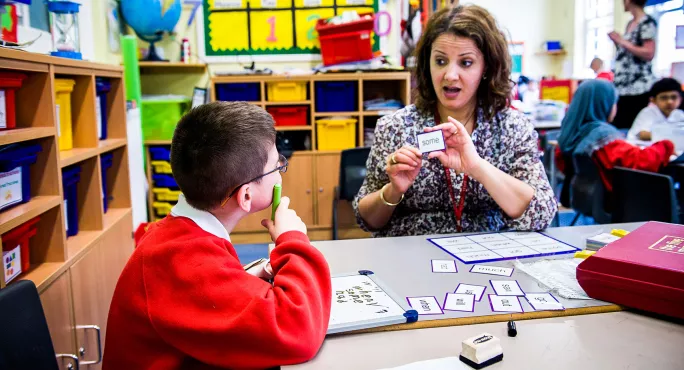Make parent pledge a legal requirement, DfE advised

The “Parent Pledge” should be included in statutory guidance that schools have a legal requirement to follow, the children’s commissioner has said.
In a new report, released today, Dame Rachel de Souza proposed that the Department for Education should include the pledge in statutory guidance as part of her plan to overhaul provisions for pupils with special educational needs and disabilities (SEND).
She said this would make clear what parents should expect from schools through the pledge and how this support would be funded for pupils with SEND.
The Parent Pledge - introduced in the Schools White Paper - sets the expectation that schools identify when pupils fall behind in English and maths and keep parents informed of their progress.
- SEND: Revealed: 7 ways the DfE’s Send reforms could fail
- Parent Pledge: Parent pledge dismissed as ‘policy gimmick’ by heads
- Green Paper: Why the DfE will need to win parents over
Dame Rachel’s report warns that it is currently unclear whether resource to fund the Parent Pledge and additional support in English and maths for pupils with SEND will be drawn from the SEND budget.
The report says: “The children’s commissioner recommends that the government introduces statutory guidance so that families understand what level of care they should expect from Parent Pledge, school SEND and EHCP (education, health and care plan) funding.
Introduced through the Schools White Paper in March, the Parent Pledge set out that teachers should identify and provide targeted support to children who fall behind in English or maths.
The notion was decried at the time by sector leaders, including the general secretary of the Association of College and School Leaders, Geoff Barton, who described it as “a policy gimmick designed to grab headlines”.
Earlier this year, the DfE told schools that they should consider budgeting for its new Parent Pledge in their plans for this academic year.
Dame Rachel’s report makes a series of other recommendations for improving outcomes for pupils with SEND.
The children’s commissioner says the government should ensure that mainstream schools are better equipped to support young people with SEND.
The report says this should include more support for schools looking to develop in-house alternative provision offers and that more schools should be encouraged to work together via their family of schools or academy trusts to provide good quality alternative provision.
It also calls for a new cross-Whitehall body to be established to drive through reforms across education, health, and social care.
Dame Rachel said: “There is no reason why children with SEND can’t achieve great outcomes: whether that be travelling independently, starting an apprenticeship or going to Oxbridge.”
She said the current system was “not sufficiently ambitious” for children with SEND, with diagnosis often used as an excuse for poor attendance, low attainment and poor expectations for higher education and employment.
“The prize of getting this right is enormous, not just in terms of improved experiences for children and families but in terms of improved life chances and ambitions realised,” she added. “This must be our motivation to reform, innovate, integrate and invest to improve our offer to children.”
The sector awaits next steps of the government’s Green Paper under the auspices of new children’s minister Claire Coutinho, who replaced Kelly Tolhurst in prime minister Rishi Sunak’s recent Cabinet reshuffle.
The consultation on the SEND Green Paper, which proposed a major overhaul of the system, came to a close over the summer and a government response is due before the end of the year.
Commenting on today’s paper from the children’s commissioner Mr Barton said: ”We agree that all pupils should be supported to succeed at school, and that parents should be kept informed about their child’s progress.”
Mr Barton said the “the simple fact is that the vast majority of schools are already doing this”.
He added that assessment systems for tracking progress are already in place and schools are legally obliged to report to parents on their child’s learning at least once a year.
“While the focus should be on high-quality whole-class teaching, some pupils will need greater support and intervention. Schools are best placed to determine this and the Pledge risks damaging relationships between parents and teachers by creating unrealistic expectations about what pupils need,” Mr Barton added.
“Schools are operating with extremely limited resources and, amid spiralling costs, risk having to cut educational provision. They need proper funding as opposed to cheap gimmicks in order to avoid a decline in standards.”
Register with Tes and you can read two free articles every month plus you'll have access to our range of award-winning newsletters.
Keep reading with our special offer!
You’ve reached your limit of free articles this month.
- Unlimited access to all Tes magazine content
- Save your favourite articles and gift them to your colleagues
- Exclusive subscriber-only stories
- Over 200,000 archived articles
- Unlimited access to all Tes magazine content
- Save your favourite articles and gift them to your colleagues
- Exclusive subscriber-only stories
- Over 200,000 archived articles



